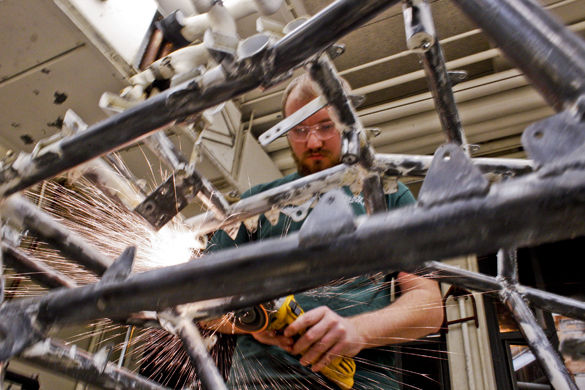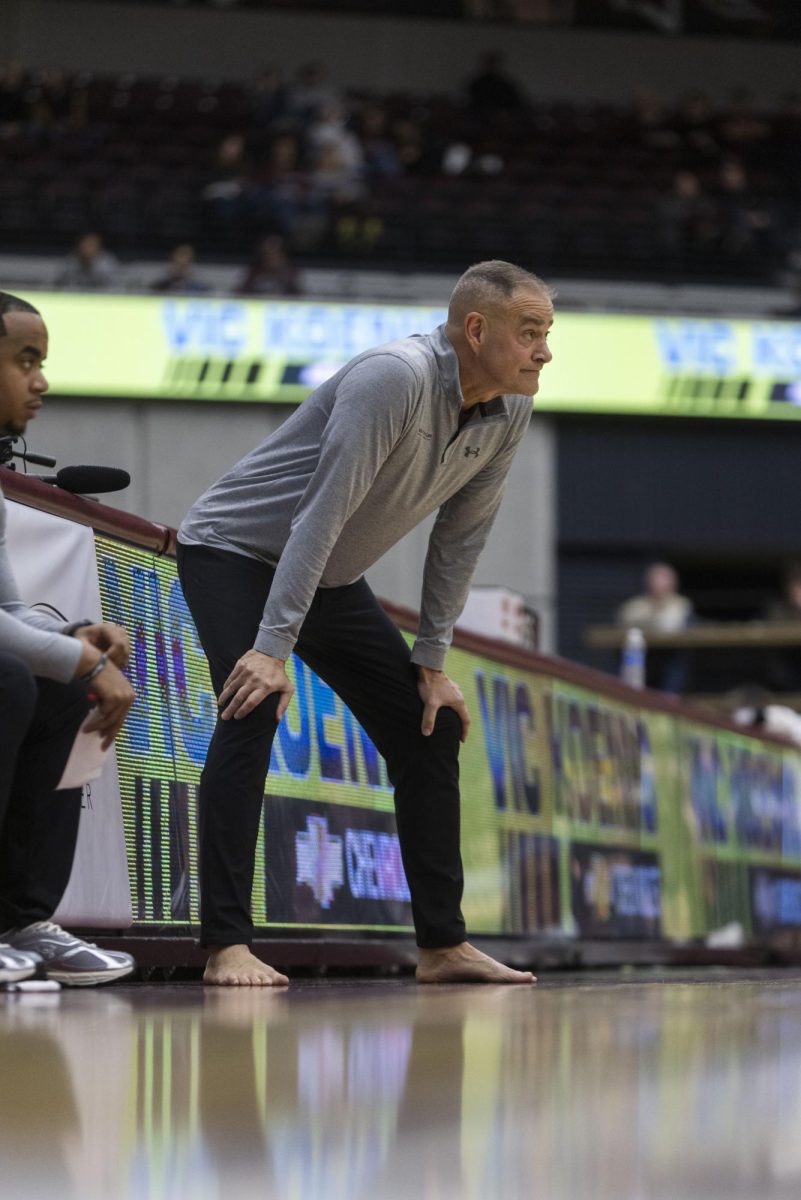Dune-buggy building RSO prepares for endurance test

Jacob Strutner, a sophomore from Farmer City studying mechanical engineering, and the vice president of the SAE Saluki Baja club, cuts off the old suspension mounts from the front of last year’s racer to make room for the new mounting points Monday in a workshop in the Engineering D building. The group is building its racer to compete in the SAE Baja, or Society of Automotive Engineers Baja, series that will be held in Cookeville, Tenn., from April 14 to 17. During the competition last year, the team came in 53rd. “Hopefully we do better than last year,” Strutner said. “It wasn’t what we were hoping for in a competition.”
February 15, 2016
SIU engineering students are putting down the calculators and picking up a tool box to put together dune buggies that will be raced in a interstate competition.
The SIU Baja team, a Registered Student Organization, is rebuilding its vehicle from last year’s competition to return to the 100-team dune-buggy style race. With the competition three months away, the team is fundraising to send its 22 members to Cookeville, Tenn., where the Society of Automotive Engineers meet is held at Tennessee Technological University.
{{tncms-asset app=”editorial” id=”d03a49f4-d450-11e5-88f3-fb3e4af96264″}}
Advertisement
Baja president Dalton Williams, a sophomore from Riverton studying mechanical engineering, said the race is not to test the drivers’ abilities, but the vehicle’s durability.
The four-day event encompasses five races — including a four-hour endurance race — on courses made up of tight turns, steep hills, rocks and other obstacles trying to highlight any deficiencies in the design of the vehicle, he said.
Williams said transporting and housing 22 students costs about $5,000, and building a new race car costs nearly $15,000, but the luxury of this year’s Baja team is that they still have a functioning vehicle. Because money is not being spent on a new frame, Williams wants to buy equipment for the team’s pit crew, which will allow SIU to compete with teams that have a larger budget. He also hopes to improve the group’s race track garage at competitions with tools and other equipment to give his team an edge.
So far, the team has raised $8,000, Williams said, but sponsors such as General Cable in Du Quoin have paid for entrance and registration fees.
Todd Moore, the team’s treasurer, said alumnus of the program and local businesses also help pay for expenses throughout the year. Fox Racing has provided discounted materials to the team.
But sometimes it just takes a little extra time and elbow grease to get sponsors.
Joel Wise, a sophomore from Robinson studying mechanical engineering, fixed his boss’ truck for money toward the RSO.
Advertisement*
Wise and his fundraising team created a list of “whales,” or bigger businesses, that might be interested in providing monetary assistance for the group.
“We spent a whole day making a list,” he said. “There was anything from Maxim magazine to the Ford [Motor] Company.”
SIU Foundation, a corporation that provides monetary aid to university research groups, set up crowdfunding for the RSO — the first time it has done so, Williams said.
At its most recent event — Midnight Mayhem held at University of Louisville — the team’s two cars finished in the top half of the field.
“The best part is going to competitions,” said Jack Girote, a senior from Frankfort studying mechanical engineering. “There were over 90 cars at this unofficial competition. It was like being in a pit crew on a Nascar team.”
Members learn how to use a mill, a lathe, a tig welder, grinders and drill presses, but Williams said he does not expect every member to know how to do each task.
“As an engineering student I do math all day,” Girote said. “To come here and not have to worry about math for four hours is great. It’s a lot more enjoyable to do this here and get the experience. To see it all come together at the end is well worth the time.”
Evan Jones can be reached at [email protected] or 618-536-3304.
Advertisement








